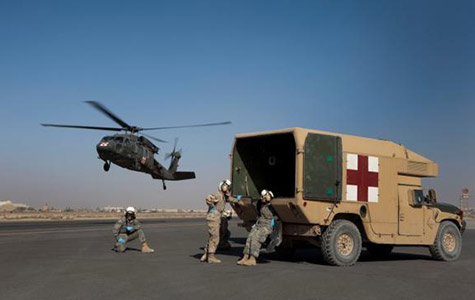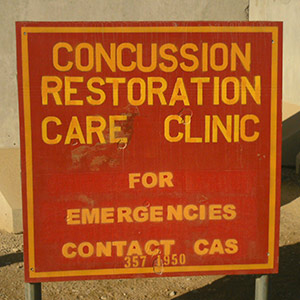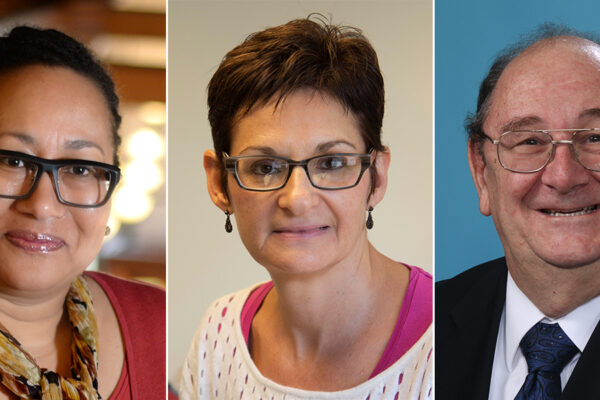
Evaluating military personnel with blast-related mild traumatic brain injuries, researchers have found that early symptoms of post-traumatic stress, such as anxiety, emotional numbness, flashbacks and irritability, are the strongest predictors of later disability.
The results were surprising because mental health more closely correlated with disability than assessments typically made after concussions, such as tests of memory, thinking, balance, coordination and severity of headaches and dizziness, according to the study led by Washington University School of Medicine in St. Louis.
“Symptoms of post-traumatic stress and depression have always been thought to develop months to years later,” said David L. Brody, MD, PhD, associate professor of neurology at Washington University. “We don’t know what causes these symptoms, whether they result from the brain injury itself, from the stress of war or some combination of factors. But regardless of their origin, the severity of these psychological symptoms soon after injury was the strongest predictor of later disability.”
Appearing March 4 in the journal Brain, the study also suggests that mild concussions have more severe long-term effects than previously thought, including difficulty returning to previous work, family and social activities. The results raise questions about how best to treat U.S. troops who suffer head injuries.
During the conflicts in Iraq and Afghanistan, about one-fifth of service members experienced a head injury, according to recent estimates from the U.S. Department of Defense, and more than 80 percent of those were considered mild.
“I was surprised by how severe the level of disability was 6-12 months after these seemingly mild injuries, especially given that virtually all of these patients returned to duty soon after their concussions,” said Brody, the study’s senior author.

According to the investigators, the study is the first to evaluate active-duty service members with blast-related mild concussions very early, in the first week after injury, and to combine that with follow-up evaluations of the same patients 6-12 months later. Most studies of traumatic brain injury in military personnel have focused on those injured severely enough to be evacuated from war zones.
In partnership with the U.S. military, investigators at Washington University in St. Louis and the Naval Medical Center Portsmouth in Virginia evaluated traumatic brain injury from blast exposure in active-duty military personnel stationed in Afghanistan in 2012.
The study included 38 patients diagnosed with mild blast-related brain injury and 34 service members without brain injury who volunteered to serve as controls. Those in the study ranged in age from 19-44, with a median age of 26 in the study group and 28 in the control group.
Early assessments of service members were made in Afghanistan within the first week after injury. To evaluate mental health, the investigators used a standard military questionnaire for assessing symptoms of post-traumatic stress disorder, such as experiencing repeated, disturbing memories or dreams, feelings of emotional numbness, difficulty concentrating and feelings of anger or hyper-alertness. Follow-up mental health assessments were conducted with standard interviews 6-12 months later.
At the later evaluations performed at Washington University in St. Louis, 63 percent of patients in the brain injury group were classified as moderately disabled, compared with 20 percent of the control group. Patients were classified as moderately disabled if they were unable to work as they did before injury; unable to continue previous social and leisure activities; or had mental health problems that disrupted relationships with family and friends. The remaining 37 percent of the brain injury group were considered to have a good recovery.
“When we were able to connect the dots, we saw that injuries that might have been considered trivial seemed to have a big impact on how these patients did later on,” said first author Christine L. MacDonald, PhD, who conducted the study while at Washington University. She is now at the University of Washington in Seattle.
This result was unexpected, according to the investigators, because the vast majority of past research on traumatic brain injury in military personnel and civilians has focused on cognitive function and physical symptoms such as headaches.
“Most previous studies have hypothesized that things such as duration of loss of consciousness, duration of post-traumatic amnesia and how well patients could perform tasks of thinking, memory, attention, balance and coordination would be the predictors of later disability,” Brody said. “We looked at these factors. And they were not strongly correlated with how well patients did long term.”
MacDonald said the findings suggest that care for brain injuries among military personnel should be broadened to include psychological evaluations earlier in the process. Similar to the decision criteria for civilians returning to sports, school or work after concussions, the criteria used to determine whether a service member should return to active duty now are focused on cognitive function and clinical symptoms and do not include assessments of mental health.
“We hope to contribute to the discussion about what should be done for these patients when they come in with seemingly mild concussions,” MacDonald said. “We need to investigate whether there are new approaches to early care that will improve their quality of life over the long term.”
Brody and MacDonald credit a partnership with the study’s principal investigator in Afghanistan, Lt. Cmdr. Octavian Adam, MD, of the U.S. Navy, for making this study possible. Adam is a neurologist at Naval Medical Center Portsmouth and was deployed to provide care for U.S. troops.
“We wouldn’t have been able to do the study if Lt. Cmdr. Adam hadn’t reached out to us to collaborate,” MacDonald said. “The logistical complexities of conducting a study in an active war zone were extraordinary.”
As such, Brody and his colleagues are planning a similar study of civilian concussions, looking at mental health measures immediately following mild head injuries in patients who come to the emergency room. Those patients will be followed to determine long-term outcomes.
“The lessons that we learn from military trauma apply quite readily to civilian trauma,” Brody said. “Still, there may be unique aspects of military brain injury that are not true in the civilian world. It could also be that this is a general phenomenon that has not been carefully addressed in civilian or military populations.”



Comments and respectful dialogue are encouraged, but content will be moderated. Please, no personal attacks, obscenity or profanity, selling of commercial products, or endorsements of political candidates or positions. We reserve the right to remove any inappropriate comments. We also cannot address individual medical concerns or provide medical advice in this forum.